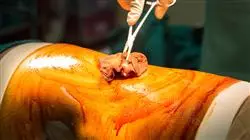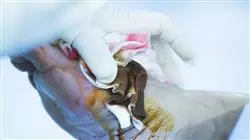University certificate
Accreditation/Membership
The world's largest faculty of nursing”
Introduction to the Program
The nursing professional needs to keep up to date with the surgical intervention processes they perform every day. In this program you will find the keys to increase the level of professional performance with a practical methodology 100% virtual, through the best didactic material with real clinical cases"

The surgical area is an environment whose characteristics differentiate it from the rest of the services where the majority of nursing professionals habitually develop competencies in their care, management, teaching and research functions. The evolution of techniques and technological advances make it essential for nursing professionals to update their knowledge in order to provide excellent surgical care.
Each of the wide variety of surgical interventions that are performed requires a specific procedure, a specific technique and the exclusive surgical material for that intervention. All of them have in common a series of steps and rules that the members of the team must know in detail, in addition to the general functioning of the surgical unit, in order to avoid and prevent the most common risks in the development of the professional activity.
Being institutions aware of this, they demand academic profiles with a training that adapts to the requirements of their job and that are qualified and endorsed for the performance of the same.
This ensures that the professional, whether or not they have worked in any of the sections that make up the perioperative process, integrates into their work practice the experience of professionals already working in leading hospitals at a national and international level with a high scientific, technological and humanistic level.
This training will generate a sense of security in the performance of nursing practice, which will help you grow personally and professionally"
This Master's Degree in Advanced Operating Room Nursing contains the most complete and up-to-date scientific program on the market. The most outstanding features are:
- Clinical cases presented by experts in Advanced Operating Room Nursing
- The graphic, schematic, and practical contents with which they are created provide scientific and practical information on the disciplines that are essential for professional practice
- New developments on nursing care and advanced surgical intervention
- It contains practical exercises where the self-evaluation process can be carried out to improve learning
- Algorithm-based interactive learning system for decision-making in the situations that are presented to the student
- With special emphasis on evidence-based nursing and research methodologies in advanced surgical nursing
- All of this will be complemented by theoretical lessons, questions to the expert, debate forums on controversial topics, and individual reflection assignments
- Content that is accessible from any fixed or portable device with an Internet connection
This Master's Degree may be the best investment you can make in selecting a refresher program for two reasons: in addition to bringing your knowledge up to date in Advanced Operating Room Nursing, you will earn a degree by TECH Global University"
Its teaching staff includes professionals from the field of advanced surgical nursing, who bring the experience of their work to this training, as well as recognised specialists from leading scientific societies.
The multimedia content developed with the latest educational technology will provide the professional with situated and contextual learning, i.e., a simulated environment that will provide an immersive training program to train in real situations.
This program is designed around Problem Based Learning, whereby the student must try to solve the different professional practice situations that arise during the course. To this end, the nurse will be assisted by an innovative interactive video system developed by recognised experts in the field of surgical nursing with extensive teaching experience.
Increase your decision-making confidence by updating your knowledge through this Master's Degree"

Take the opportunity to learn about the latest advances in Advanced Operating Room Nursing and improve your nursing practice"
Why study at TECH?
TECH is the world’s largest online university. With an impressive catalog of more than 14,000 university programs available in 11 languages, it is positioned as a leader in employability, with a 99% job placement rate. In addition, it relies on an enormous faculty of more than 6,000 professors of the highest international renown.

Study at the world's largest online university and guarantee your professional success. The future starts at TECH”
The world’s best online university according to FORBES
The prestigious Forbes magazine, specialized in business and finance, has highlighted TECH as “the world's best online university” This is what they have recently stated in an article in their digital edition in which they echo the success story of this institution, “thanks to the academic offer it provides, the selection of its teaching staff, and an innovative learning method aimed at educating the professionals of the future”
A revolutionary study method, a cutting-edge faculty and a practical focus: the key to TECH's success.
The most complete study plans on the university scene
TECH offers the most complete study plans on the university scene, with syllabuses that cover fundamental concepts and, at the same time, the main scientific advances in their specific scientific areas. In addition, these programs are continuously being updated to guarantee students the academic vanguard and the most in-demand professional skills. In this way, the university's qualifications provide its graduates with a significant advantage to propel their careers to success.
TECH offers the most comprehensive and intensive study plans on the current university scene.
A world-class teaching staff
TECH's teaching staff is made up of more than 6,000 professors with the highest international recognition. Professors, researchers and top executives of multinational companies, including Isaiah Covington, performance coach of the Boston Celtics; Magda Romanska, principal investigator at Harvard MetaLAB; Ignacio Wistumba, chairman of the department of translational molecular pathology at MD Anderson Cancer Center; and D.W. Pine, creative director of TIME magazine, among others.
Internationally renowned experts, specialized in different branches of Health, Technology, Communication and Business, form part of the TECH faculty.
A unique learning method
TECH is the first university to use Relearning in all its programs. It is the best online learning methodology, accredited with international teaching quality certifications, provided by prestigious educational agencies. In addition, this disruptive educational model is complemented with the “Case Method”, thereby setting up a unique online teaching strategy. Innovative teaching resources are also implemented, including detailed videos, infographics and interactive summaries.
TECH combines Relearning and the Case Method in all its university programs to guarantee excellent theoretical and practical learning, studying whenever and wherever you want.
The world's largest online university
TECH is the world’s largest online university. We are the largest educational institution, with the best and widest online educational catalog, one hundred percent online and covering the vast majority of areas of knowledge. We offer a large selection of our own degrees and accredited online undergraduate and postgraduate degrees. In total, more than 14,000 university degrees, in eleven different languages, make us the largest educational largest in the world.
TECH has the world's most extensive catalog of academic and official programs, available in more than 11 languages.
Google Premier Partner
The American technology giant has awarded TECH the Google Google Premier Partner badge. This award, which is only available to 3% of the world's companies, highlights the efficient, flexible and tailored experience that this university provides to students. The recognition as a Google Premier Partner not only accredits the maximum rigor, performance and investment in TECH's digital infrastructures, but also places this university as one of the world's leading technology companies.
Google has positioned TECH in the top 3% of the world's most important technology companies by awarding it its Google Premier Partner badge.
The official online university of the NBA
TECH is the official online university of the NBA. Thanks to our agreement with the biggest league in basketball, we offer our students exclusive university programs, as well as a wide variety of educational resources focused on the business of the league and other areas of the sports industry. Each program is made up of a uniquely designed syllabus and features exceptional guest hosts: professionals with a distinguished sports background who will offer their expertise on the most relevant topics.
TECH has been selected by the NBA, the world's top basketball league, as its official online university.
The top-rated university by its students
Students have positioned TECH as the world's top-rated university on the main review websites, with a highest rating of 4.9 out of 5, obtained from more than 1,000 reviews. These results consolidate TECH as the benchmark university institution at an international level, reflecting the excellence and positive impact of its educational model.” reflecting the excellence and positive impact of its educational model.”
TECH is the world’s top-rated university by its students.
Leaders in employability
TECH has managed to become the leading university in employability. 99% of its students obtain jobs in the academic field they have studied, within one year of completing any of the university's programs. A similar number achieve immediate career enhancement. All this thanks to a study methodology that bases its effectiveness on the acquisition of practical skills, which are absolutely necessary for professional development.
99% of TECH graduates find a job within a year of completing their studies.
Master's Degree in Advanced Operating Room Nursing
At TECH Global University we have a Master's Degree in Advanced Operating Room Nursing, whose objective is to train health sector professionals in the use of the equipment and devices necessary to ensure that patients undergo surgery with quality, safety and without complications. Additionally, our postgraduate program is an opportunity for nurses to remain in a continuous learning process, since the advancement of surgical techniques and new technological discoveries in surgery must be incorporated as soon as possible in health centers.
The best postgraduate program in operating room nursing
.
Students of the TECH Faculty of Nursing, in addition to coordinating surgical teams in their respective workplaces after graduation, will be able to perform in the most common surgical procedures according to the different specialties of Medicine. For example, they will be prepared to intervene, from Nursing, in plastic surgeries (breast surgeries, liposuction, reimplants or burns), orthopedic surgeries, neurosurgeries (skull, spine or peripheral nerves), cardiac surgeries, ophthalmology (cataracts, retinal pathology, corneal pathology or glaucoma), gynecological, maxillofacial, thoracic and urological, among others.







